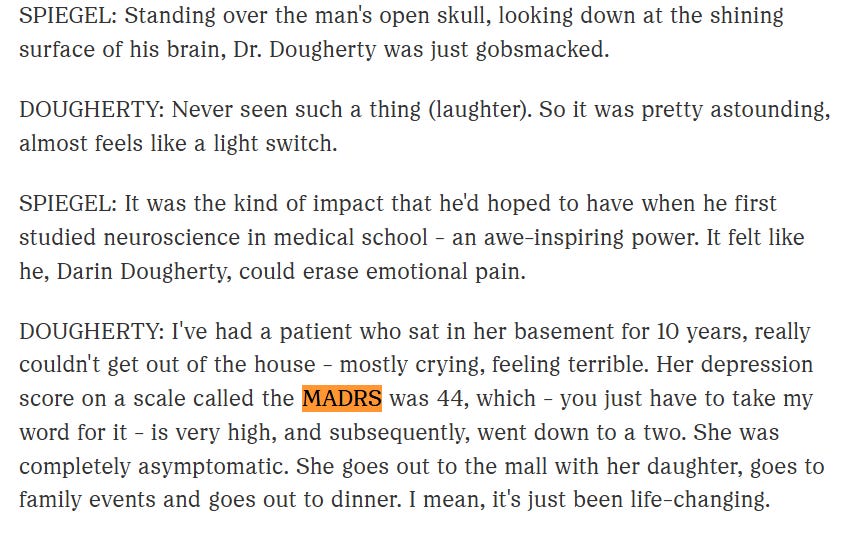Revisiting the story of Megans remote controlled mind
A few years ago, I had a private conversation with a woman named Megan. She is/was one of only a few people in the world with a DBS implant in her brain for the treatment of OCD. Something interesting I found years ago when I was looking at some of the psychiatric disorders with experimental DBS lead implants was that the people who responded well weren’t like the things you see with pharmaceuticals. This is as true as the near immediacy that’s exhibited by controlling for tremor of Parkinson’s using DBS of STN as it is for depression and OCD. While these indications aren’t down to something where every implant results in a responder (which is a big deal). Above is an audio recording of a surgeon describing what I’m talking about with the full link attached. It’s a really interesting interview.
Now I was in the Navy and then a psychiatrist diagnosed me with obsessive compulsive disorder from which I was subsequently discharged. I don’t if that’s true (as in if I have OCD), but I do clearly have some degree of tendency for obsessive ruminations on subjects and it typically lasts a really, really long time. It’s part of why Megan’s story has stuck with me for so long. It becomes uncomfortable for me every time it happens. I don’t even know why I do it, it just kind of seems to happen. I described it to Bill Brewster and some number of other people in private conversations months ago. I don’t like that at times my process becomes all consuming. It hurts. Even when it’s actually helped me on paper it hurts. No one wants to actually go through that. You don’t even want to really see it. Especially because when you dig yourself into rabbit holes, they usually just lead you to nowhere. Clearpoint led me to a wonderland of invention, but it’s still slow.
Now I recently wandered into something that I’m only now fully truly learning that I didn’t want to sink any time at all thinking or talking about to anyone in the world. I’m definitely not like the poor sap that was described as living with a MADRS’s score of 44 in Megans story. But the same exact thing that tortured me amazed me about Megan all those years ago when I couldn’t stop thinking about ClearPoint Neuro to save my life. I knew they needed to raise, but I was imagining myself living in this time where AMT-130 and million different flavors of therapeutics like it existed. It’s been almost 4 years since that started, and I don’t know that we are really going to have anything besides Upstaza and AMT-130 for a long while.
To this day it still amazes me that a guy with a MADRS score of 44 could have an electrode that gets put into his dome and then he goes into remission. In my uneducated medical opinion, that speaks to some pretty fundamental aspect of MDD that’s not normally thought about when you think of that indication. In more interesting and recent news, accelerated TMS of the saint protocol (FDA approved) with imaging personalization results in durable remission rates for depression that are astounding. I’m definitely thinking of trying that out.
It’s a funny series of words, but psychomotor retardation is real thing. You feel physically slow with inhibited movement. Your muscles are weak. Your mental work horse slows down. Even the very perception of time for you just feels fundamentally different.
That’s why for anyone that’s ever felt depressed before and is lucky enough to not be in that state, whenever they hear someone talk about how depressed people simply need a good pick-me-up or something fun to do it sounds completely ridiculous to them. It sounds ridiculous because those people don’t actually know what depression even is. Something is going physically wrong inside the brains of depressed people, which is why they’re depressed.
My current source of depression is coming from this extreme exogenous shock of rediscovering something that’s scary. I put on a brave face for a short while, but this has been something I’ve been living with for a hot minute now. Vlad Zamfirs lesson to me and the blatant absurdity isn’t and won’t ever be enough to subdue it. You can call it generalized anxiety or something else to that extent, but I guarantee you that our perspectives on this matter aren’t shared ones. It may be unwarranted; it may not be. But that doesn’t change anything for me right now and I expect it won’t change anything for a very long time.
The only lesson I have ever really learned well here is that you should never ever ever ever trample on gardens that weren’t meant to be trampled upon.




